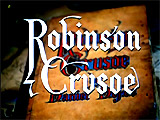
|
Robinson Crusoe (1954, Mex./US)
(aka (The) Adventures of Robinson Crusoe)
In director Luis Bunuel's adventure saga (his only
American-financed film, his first big-budget production, his first
color film, and sole film in English), based upon Daniel Defoe's
classic 1719 novel, told predominantly through voice-over narration
- [Note: the film was released in Mexico two years before its American
distribution.]:
- the opening title credits sequence set above an
opulent leather-covered book atop an ancient map - the voluminous
novel with an unidentified hand opened the cover, and read from
the opening passage (in voice-over): "Being the third son
of a good family and not educated to any trade, my head began to
be filled early with thoughts of leaving England to see the world.
And thus against the will, nay the commands of my father, I broke
loose and went to sea. How true my father's prophecy of disaster,
for not long after being in the latitude of 12 degrees, 18 minutes
bound for Africa to buy Negro slaves for my fellow planters in
the Brazils, a violent tornado came upon us which carried us westward.
Far out of the way of all human commerce"
- the reading was accompanied by the sequence of the
stormy shipwreck of the Ariel on a voyage from Brazil to
Africa in September 1659, that left young English aristocrat Robinson
Crusoe (Best Actor-nominated Dan O'Herlihy), a slave trader, stranded
on a deserted island; as he wandered on the island
barefooted, he noted: "My only possession, my only weapon";
after a night's sleep in a tree, he continued: "I woke refreshed
and half perished with hunger"; he reached over to a
nearby nest, cracked open an egg found there and discovered a live,
downy baby bird inside; he safely returned the hatchling to its nest
(without resorting to cannibalism), and then added: "Thirsty, without
provisions, with little hope of survival, I set out to survey my fate.
No other land in sight. I was on an island, and barren by the sea"
- he raced down to the shore where he had joyfully
sighted the wreckage of the ship caught on offshore rocks far off
in the distance: "The wreck of our ship stranded during the
night"; he
swam out and discovered a fellow survivor on board: Sam
(a scraggly black and white cat); he plundered
what he could from the wreckage, including drinking water, bread,
"clothes, tallow, gunpowder, the carpenter tools and scores
of other most useful articles," plus gold coins (he realized
their uselessness: "What use to me?"), and "tinder,
steel, flint" - to
make a fire ("Worth more to me than all the gold in the world");
the supplies were transported back to the island on a makeshift
raft

|

|

|
|
Salvaging from the Ship's Wreckage
|
Makeshift Raft to Bring Supplies to Shore
|
"Tinder, Steel, Flint" - To Make a Fire
|
- on shore that evening, he was overjoyed to discover
Rex (a German shepherd) from the ship; soon after, the ship shifted
off the rocks and sank with a loud noise ("That fearful sound
had been the death cry of our poor ship"); he mused that the
only other survivors of the wreck - stowaway rats - were unwelcome
on the island: ("The only things from the ship that I did not want
ashore") - and stomped some of them to death
- the scenes of his survival over the first few months
were consumed with preparing emergency signals: ("I kept dry branches
ready to flame into a mighty beacon"), creating a protective stockade
for shelter - to secure his safety from wild animals, and digging
a supply storeroom in a cave compound; he also hunted wild fowl, cut open
coconut for milk, regularly searched the horizon: ("Trips to my lookout
hill to search for sight of ships"), and kept diary notes
- the instances of loneliness, isolation,
and recurring hallucinations when he fell ill and feverish during his
11th month (and the film became reddish tinted): his "terrible
dream" and delirium in the cave involved the imagined arrival
of his disapproving, reprimanding and rebuking patriarchal father (also
O'Herlihy) for having traveled away from home: "Why did you fling yourself
into this stupid adventure?"; while bathing a pig with fresh water,
the father taunted the wayward son; his father was also seen floating
face-up and Messiah-like in water, until a force pulled him under;
and then the suffering Crusoe perceived himself as bound to a crucifix
and suspended in a pool of water that he could not reach down and
drink from
|
Hallucinations of Robinson Crusoe
|

|

|

|
|
Reprimanding Father
|
Bathing a Pig With Fresh Water
|
Father Floating Face-Up
|

|

|

|
|
On a Crucifix While Immersed in Water
|
Drunkenly Singing with Shipmates
|
Scarecrow with Woman's Blue Dress
|
- as time passed, Crusoe found a Bible inside one of
his salvaged chests with a Bible ("a cure for both the body
and soul"), tobacco, and some wheat seeds (that he planted for
a wheat crop); he also located fruit and banana trees, sugar cane,
and more; he made one failed attempt to sail in a canoe to a distant
island; he herded goats into a corral and drank their milk, and adopted
a parrot named Polly; Sam had a litter of kittens (he asked rhetorically
about the feline's immaculate conception:
"Where did you find their father?" - it was "the one
mystery of the island I never solved")
- after setting up a rickety scarecrow cross (with a
woman's cornflower-blue dress garment hung on it) to protect his
crops from birds, he again suffered from longings for an illusory
female that he thought he saw above the scarecrow
- while celebrating his fifth year anniversary, he
drunkenly imagined a sing-along with former shipmates to the shanty
song "Down
Among the Dead Men," but then when he realized he was fantasizing, he
despaired at his loneliness
- later, he pondered about his extreme imprisonment
on the island and dreamed of escape: "Sometimes in the midst of my
work, the anguish of my soul and my loneliness would break out
upon me like a storm. Escape. No matter the dangers, I must do something
to escape this tomb, this prison. My heart died within me. Alone.
Alone. Forever alone. I was a prisoner, locked up by the eternal
bars and bolts of the ocean. Days became weeks, weeks became months,
months became years. I quite gave up looking to see for ships"
- after the death of his beloved dog Rex from old age
in 1673 (14 years after arriving on the island), Crusoe buried Rex
and set up a marker; in a despairing scene, Crusoe recalled: "Now
truly alone, starved for the sound of another voice, any voice. I
would rush to the valley of my echo"; Crusoe's echoed voice cried
out in a valley as he called out the words of the 23rd Psalm for
comfort: "The Lord is My Shepherd" - although it brought no solace
- afterwards that evening, feeling totally alone ("The
world seemed but a whirling ball. Its oceans and continents, a green
scum, and myself. With no purpose. And no meaning"), he raced
to the water's edge with his lighted torch, crying out
"Help!" to an unseen and unhearing savior, before extinguishing
the flames of hope in the disheartening, imprisoning water before him;
he turned around and marched directly toward the camera (until his
body blackened the screen)
- the obligatory insect sequence (for director Bunuel)
in which Crusoe acted as God; he greeted two "little friends" (ant
lions) and placed them in a mound of dirt to hide; then he promised:
"Just you wait there in your homes and I will feed you"; he pinched
an ant between his fingers ("Here's a morsel for ya!"), dropped
it onto the mound of dirt, and watched as his two friends 'consumed'
the ant, while amused and cheering them on: "Get him, get him!"
- in 1677, after being on the island for 18 years, the
eccentric Crusoe was startled to discover a large footprint imprinted
into the beach sand on the other side of the island; he placed his
own foot into the imprint; the sight and thought of others on the
island caused him extreme paranoia ("Condemned to all those years
of loneliness, now trembling in the very apprehension of seeing another
human. How mad men are possessed by fear")
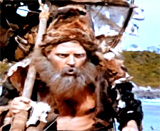
|

|

|
|
Startling Discovery of Human Footprint After 18
Years
|
- that night, he spied upon a group of natives on the
beach, horrified at them for being cannibals: "Men eaters. From
that very land I had once thought to sail to. Revolted, horrified,
all that night, I observed the cannibals at their ghastly entertainment";
then the next morning after they departed, he found the aftermath
- the charred remains of a cannibalistic party with gruesome body
parts (human heads and bones) of victims scattered about the beach;
he became very disturbed and slept fitfully: ("I knew no peace
for months and months"); he prepared
for an assault on his stockade, and even fantasized about constructing
a "bomb" trap under their fire-pit to blow up the "monsters"
- but then reconsidered: "After passion, hatred, I realized I had no
heaven-sent right to be judge and executioner on these people, who had
done me no injury. I would leave them to God’s justice. I would
not interfere with them unless they attacked me first”
- later, when the cautious Crusoe spotted smoke and
the sound of drums, he spied upon the cannibals on the beach who
had returned with two victims; one of them, a savage, dark-skinned
native (Jamie Fernandez) broke away from his captors and was
chased down the length of beach by two of the cannibals; Crusoe knocked
one cannibal unconscious with his gun, and shot the second one to
death; as the captive native bowed down at Crusoe's (and Crusoe
placed his foot on the native's head), the first cannibal revived;
the captive quickly grabbed Crusoe's machete and stabbed the cannibal
to death; Crusoe stood watch as the freed native dug holes in the
sand to bury the corpses
- back in his stockade, Crusoe named
the escapee for the day of the week - Friday (the day he was rescued);
he tried to teach him some words: "Friday, Master, Friends...Eat!",
and
'Friday' from the start was designated as his servant; when the
native rejected Crusoe's baked bread and gestured that he would
prefer to eat the corpse of the buried cannibals instead, Crusoe
scolded: "No, no eat man, wrong!"
- Crusoe
was immediately suspicious of him: "I dare not sleep. If the
cannibals fail to come for me before morning, he might"; when
the cannibals departed without searching for their two missing companions
the next day, Crusoe took many additional precautions: "I would
not let him handle any weapon. I used my musket to ensure his continued
fear and respect of me. I put a strong door to my cave so he could
not take me unawares at night"; after shooting a bird and cooking
it for dinner, Crusoe was relieved and reassured: "How reassuring
it was to see him eat the flesh of animals knowing that the only
source for that other meat he so relished would be my self"
- however, Crusoe remarked: "How pleasant it was,
once more to have a servant" - and he taught him how to use
a fork; nonetheless, Crusoe worried that Friday would forget his
obligations to him and
"plunder my precious possessions" and "feast" upon
him; at first, as they
struggled to trust one another, Crusoe put 'Friday' in leg irons
every night (originally to be used on slaves), fearing for his life
(when Friday snuck into his room to smoke his pipe), but then, when
Friday avowed: "Friday love Master always," Crusoe relented and removed
them: "I
cannot hold you here by force," and Friday begged to remain
with him: "No
send Friday away"; thereafter, Crusoe vowed to be his loyal
companion and friend ("I want you to be my friend. I will never
leave you"); Crusoe praised their camaraderie: "How wrong
I had been. Friday was as loyal a friend as any man could want. With
his many different skills he enriched my life on the island. We had
found that two working together could do much more than working separately"
- during a short theological discussion sequence about
the problem of evil, the two smoked together as Friday cryptically
but profoundly asked Crusoe a baffling question -- why didn't the
all-powerful God ("stronger
than the devil") destroy the devil: "If God the
most strong, why he not kill devil?" - Crusoe thoughtfully answered: "Well,
you see Friday, without the devil, there would be no temptation and
no sin. The devil must be there for us to have a chance to choose
sin or resist it"; Friday pointed out the irony: "Is God
let devil tempt us?...Then, why God mad when we sin?"; Crusoe
laughingly deflected:
"Friday can't get these things into his head"
- in one startling sequence of the savage native's domestication,
Friday decorated his neck with gold coins and feminized himself by
wearing a woman's dress; he was sternly rebuked by Crusoe who
was unamused by
the cross-dressing ("Take
that off!")
- after 28 years on the island, Crusoe still had a "burning
desire" within him to escape - and he thought of constructing a canoe
with Friday's skill and knowledge to navigate to "Spanish country...to
the north" - Crusoe spoke: "This would be my last chance to see my
native England before I died"
- suddenly, there was a second
major encounter with the cannibals; Friday saved Crusoe's life by killing
one cannibal who had aimed his bow and arrow at his master; they
also pursued two other threatening cannibals through the jungle (killing
both of them); after seeing another landing of cannibals on the beach,
Crusoe and Friday began to prepare to defend themselves with multiple
guns, during their practice session, they were surprised by gunfire
- they discovered a group of white men (mutineers from
a ship) firing at the cannibals on the beach, and their two victimized
prisoners of the mutiny who were bound by rope - the ship's Captain
Oberzo (Felipe de Alba) and his Bosun (Chel López); the leader
of the mutineers - First Mate (Emilio Garibay), ordered: "Tie them
to those trees. We'll come back for you, when we have water for the
ship"; Crusoe and Friday were able to cut the ropes of the two prisoners,
tie up their mutineer-guard, and rescue the two prisoners; the Captain
explained their predicament - the mutineers had control of the weapons:
"They anchored here to take on water and abandon us when they surprised
and killed the savages... Should they return to the ship, we are
lost!"; Crusoe promised to help them prevent the mutineers' return
to the ship under two conditions: (1) that Crusoe was in charge on
the island, and (2) in exchange for their support, 'Friday' and Crusoe
would be given passage back to England

|

|
|
The Tied-Up Captain and Bosun During Mutiny
|
Crusoe's Plan to Defeat the Mutineers
|
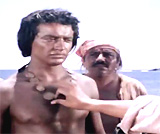
|

|
|
Friday's Tempting Gold Necklace
|
Mutineers Led by First Mate Forced to Surrender
|
- with his gold necklace as a lure (the promise
of gold coins), 'Friday' was able
to lead the greedy mutineers through the jungle back
to their stockade, where they were
overpowered and forced to surrender
- as Crusoe prepared to leave by dressing in his finest
silken garb, he stood before a mirror and recalled his younger
self, asking:
"Was I that young?"; when the Captain regained command
of his ship, he called for Crusoe and 'Friday' to board; they gathered
their possessions, including Crusoe's journal: ("The proof of
the pudding, so the people cannot say that Crusoe's mad"); he
took one last long look at his abode for the previous 28 years; the
mutineers were allowed to remain on the island (in the stockade with
Crusoe's tools and survival instructions) rather than being returned
to the gallows for their crimes; he gave them a rolled-up parchment: "I
have here instructions for you: time of planting, care of livestock,
places of concealment of weapons and powder, information also, as
to the savages, who do on occasion, visit this place. Whether or
not you learn the lessons I have learnt and survive, I cannot foresee.
And you'll have something which I for years did not have, something
for which I wept, for which my soul shriveled and starved! You have
others of your own kind. You have companions. You have man!"
- the concluding sequence of Crusoe's departure from
the island; he asked if Friday (dressed as a servant) was afraid about
leaving the island - and Friday answered: "If Master is not,
Friday is not"
- in the bittersweet ending, Crusoe looked
back from the dinghy taking him to the Captain's ship and 'heard'
his beloved deceased dog Rex barking in the distance; his last narrated
words were: "And thus, I left the island after I had been upon it
eight and twenty years, two months and nineteen days"
|

The Ariel's Shipwreck
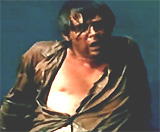
Washed Up Onto the Shore

The First Morning - Awakening in a Tree

The Hatchling in an Egg

Discovering Rex on Island

Writing in Diary Journal

Death of Rex

23rd Psalm Echoing in Valley
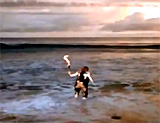

Rushing to the Ocean

"Help"

18 Years on the Island - Wearing Patchwork Quilt Clothing

Observing Charred Remains and Body Parts After Cannibals Departed

The Return of the Cannibals

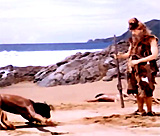


The Rescue of the Cannibals' Captive

Named "Friday" For Day of Week

"No take Friday away"

Friends

Crusoe To Friday: "Take That Off!"


Crusoe: "Was I that young?"
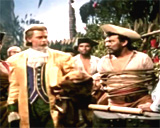
Crusoe's Instructions for the Mutineers

On the Dinghy to the Ship, Crusoe Heard Rex's Barking
Back on the Island
|



























